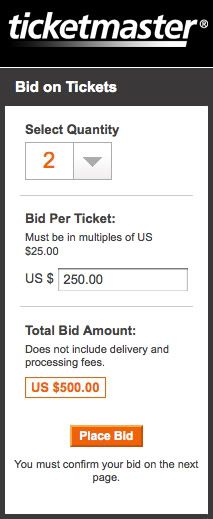 Most people will view this Ticketmaster auction for tickets to Radiohead’s just-announced Haiti Benefit in Los Angeles this Sunday at the Henry Fonda Theater as a unique, outside-the-model way to raise money for earthquake victims.
Most people will view this Ticketmaster auction for tickets to Radiohead’s just-announced Haiti Benefit in Los Angeles this Sunday at the Henry Fonda Theater as a unique, outside-the-model way to raise money for earthquake victims.
Look at it again. Look at it. You are looking at the future of ticketing: a straight-up auction model.
It’s especially terrifying because it makes perfect sense. Instead of short-changing their profits with fixed prices and watching tickets to sold-out shows sell for four or five times face value on the scalper’s auction market, Ticketmaster has actually developed a platform to sell tickets to the highest bidder while stunting the middlemen down the line.
This might be no big obstacle if you want to go see some low-level act like, I dunno, Matisyahu. But what if you’re a 12-year-old girl from a low-income family and you’re dying to see Beyoncé?
Already, we’ve seen VIP tickets and “Fan Experience” tickets for more in-demand arena shows sold by Ticketmaster for inflated prices. During Beyoncé’s last tour, for example, front-row tickets sold at face value for $500—roughly what could be expected from the second-hand market. (Meeting Beyoncé in person, after the show, cost $1,000.) Those hoping to luck out with an affordable ticket for a good seat still had hope.
I hope I’m wrong, but staring at this auction page feels like looking into a crystal ball of plutocracy for the future of ticket sales.
I know Radiohead is doing a charitable thing with this ticket auction, and I know that people are going to be talking about the “Radiohead model” with this ticket sale. But unlike their pay-what-you-will approach to albums, which humbled the recording industry into submission, this pay-what-you-will approach to tickets is a valuable springboard for the ticket industry, and it’s only going to put a lot more power and money into their greedy, uncaring hands.
TRENDING:









There are a lot of factors determining whether this system would benefit or detriment the poor 12yr old. Is there a discount or mark-up when buying in bulk? Is there a reserve on each ticket? Does the pope wear panties?
Usually in an auction system consumers are bidding on one unique item. In this case consumers are bidding on one item in a large set. With what logic would Ticketmaster increment their ticket prices? They could increment their prices by a small amount after every sale, which would benefit our girl if she gets in the auction early or effectively bar her from buying if she gets there too late. This happens currently when scalpers buy lots of tickets early, then flip the tickets later.
It doesn’t seem like a bad model to me. The people hurt most by this change are scalpers and last minute buyers. Our girl is going to have a hard time buying late regardless of which model is used. Auctioning seems like a good way to redirect sales from scalpers back to Ticketmaster. As long as the ticket prices start _lower_ than average, bigger fans (early birds) have an advantage. If it does end up making it hard for average fans to buy tickets, the model will collapse in the average fans favor, as I’d guess average fans make up an overwhelmingly large percentage of sales.
Ideally artists could negotiate with the venue themselves and set up their own ticketing system. Why should Ticketmaster even exist?
“Ideally artists could negotiate with the venue themselves and set up their own ticketing system. Why should Ticketmaster even exist?”
^^^^^ THIS ^^^^^
I agree, though I don’t believe Radiohead would typically use this method. Here is what
they say on their website:
“All proceeds are going to the Oxfam Haiti relief fund. We’re trying to raise as much money as possible, so tickets will be sold by auction at this site from 8pm tonight until 11am Saturday (PST)”